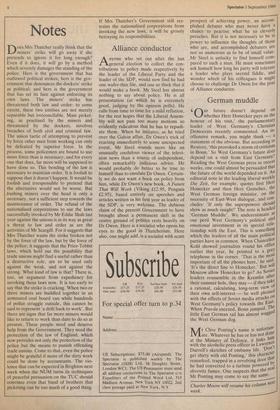Notes
Does Mrs Thatcher really think that the miners' strike will go away if she pretends to ignore it for long enough? Even if it does, it will go by a method which severely damages the standing of the police. Hers is the government that has outlawed political strikes; hers is the gov- ernment that denounces the dockers' strike as political; and hers is the government that has set its face against enforcing its own laws. The miners' strike has threatened both law and order: to some extent, these two entities are not merely separable but irreconcilable. Mass picket- ing, as practised by the miners and threatened by the dockers, involves breaches of both civil and criminal law. The union tactic of attempting to prevent by force other men from working can only be defeated by superior force. In the process, some policemen are bound to use more force than is necessary; and for every one that does, far more will be supposed to have done so. This bending of the law is necessary to maintain order. It is foolish to suppose that it doesn't happen. It would be foolish and irresponsible to pretend that the alternative would not be worse. But ,bashing miners over the head is only a necessary, not a sufficient step towards the maintenance of order. The refusal of the nationalised corporations to use the laws successfully invoked by Mr Eddie Shah last year against the unions is in its way as great a threat to law and order as are the activities of Mr Scargill. For it suggests that Mrs Thatcher wants the strike broken not by the force of the law, but by the force of the police; it suggests that the Prior-Tebbit laws, which held out the possibility that trade unions might find a useful rather than a destructive role, are to be used only against the weak, and not against the strong. What kind of law is that? There is, too, an argument from expediency for invoking these laws now. It is too early to say that the strike is cracking. When two or three miners are huddled together in an armoured coal board van while hundreds of police struggle outside, this cannot be said to represent 'a drift back to work'. But there are signs that far more miners would like to return to work than dare to do so at present. These people need and deserve help from the Government. They need the protection of the law of England, which now provides not only the protection of the police but the means to punish offending trade unions. Come to that, even the police might be grateful if more of the dirty work could be done by accountants. The vio- lence that can be expected in Brighton next week when the NUM turns its techniques of peaceful persuasion on the TUC should convince even that band of brothers that picketing can be too much of a good thing.
If Mrs Thatcher's Government still res- trains the nationalised corporations from invoking the new laws, it will be grossly betraying its responsibilities.










































 Previous page
Previous page